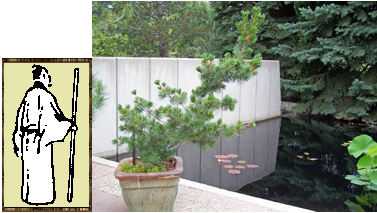
Hexagram Forty-seven—Confinement
Hexagram Forty-seven shows a stifling situation, like a tree that grows in an enclosed area with little room to spread its branches. A strong person will make it through this impasse, but not with mere words. Because of the situation, words would be ignored.
The first line, yin, shows one who has entered a valley of uncertainty. This person sits on a tree stump contemplating the years that may have to pass before relief will come.
The second line, yang, shows one exhausted, who has partaken of food and drink. When the royal representative comes, it will be well to offer that person all respect. Although an undertaking is unsuccessful, it is no one person's fault.
The third line, yin, shows a prince who rests on a rocky hillside covered with thorns. Returning to his palace, he finds his wife has left. This lack of support is unfortunate.
The fourth line, yang, shows a person in a golden carriage, sent to relieve the person in the first line, but late in arriving. Although there is some delay, in the end there will be a fruitful partnership.
The fifth line, yang, shows a regal person frustrated in their attempts. It is as if their nose and feet have been cut off. Despite setbacks, the situation is still comfortable. This person is advised to be sincere, appealing to a higher power for support.
The sixth line, yin, shows one entangled as if bound by creepers. This negativity will hold the subject back.
Hexagram Forty-seven Commentary
This hexagram discusses the various attitudes people take in oppressive situations. The experience is nearly unbearable, not just something in the mind. The introduction compares it to "a tree that grows in an enclosed area with little room to spread its branches."
The subject of the first line, yin, is in such a situation, this time described as a valley of uncertainty. The subject sits on a tree stump overwhelmed with how many years it may take to get relief.
The subject of the second line, yang, is exhausted, but has enough food and drink. Even though feeling down, there's no reason to act out and blame the system. The situation is what it is, and it is no one person's fault.
The third line, yin, shows a prince at an impasse, described as "a rocky hillside covered with thorns." When he goes back to his palace, he learns his wife has left him. Abandonment and lack of support are further consequences under oppression, because people who feel hopeless may turn on each other.
The subject of the fourth line, yang, is riding in a carriage to reach the person of the first line. It's a long trip and involves delays. However, once the connection is made, things will get better. It may seem like nothing is happening, but help is on the way.
The fifth line, yang, shows a regal person who is trying to solve a stifling situation. The person feels as if "their nose and feet have been cut off." Still, they persist, appealing to a higher power for support. The line says, "Despite setbacks, the situation is still comfortable." Things could be worse for the subject of this line.
The subject of the sixth line, yin, takes the most negative possible attitude. The subject is "entangled as if bound by creepers." The line warns how negative attitudes may become self-fulfilling prophecies, while taking a positive attitude would help.
To the reader: Most of the hexagrams have at least one line that predicts bad results, but that does NOT mean you are fated to that result. The hexagrams illustrate different attitudes, so study the actions and reactions to learn the attitudes that will lead to better outcomes.
The I Ching teaches you to flow with changes and create positive change from the inside through conscious living. Your future is in your hands. Consult the I Ching for ideas that lead to clear thinking and positive mental attitude. Reading the I Ching helps you take the time to reflect on your attitudes and ideas. Continue asking until you feel positive about your course.

Click here for another hexagram.
A note about this interpretation of the I Ching: Nori Muster wrote this version of the I Ching in 1994 and put it online at Surrealist.org in 2000. It is also available at Amazon:
e-book
paperback
